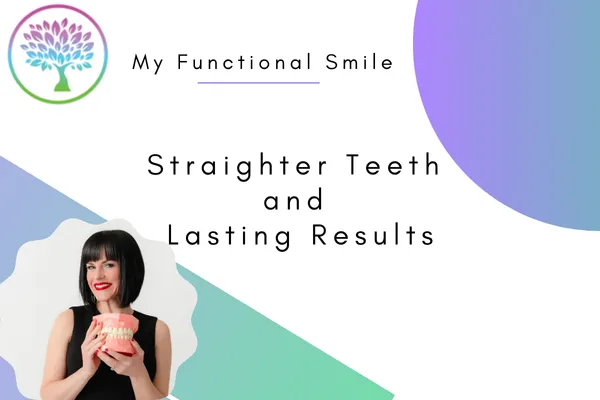
Myofunctional Therapy and Orthodontics: A Holistic Approach to Straighter Teeth and Lasting Results
Myofunctional Therapy and Orthodontics: A Perfect Partnership for Lasting Results
Orthodontic treatment is often seen as the go-to solution for straightening teeth and improving smiles. However, addressing the root causes of misaligned teeth and jaw issues can make these results more sustainable. That’s where myofunctional therapy comes in. By combining myofunctional therapy with orthodontics, patients can achieve not only straighter teeth but also better overall oral health and function.
What Is Myofunctional Therapy?

Myofunctional therapy focuses on retraining the oral and facial muscles to function correctly. It targets habits like mouth breathing, improper tongue posture, and incorrect swallowing patterns—all of which can contribute to orthodontic issues such as crowded teeth, overbites, or open bites.
This therapy uses a series of exercises to correct these habits, creating a balanced environment for teeth and jaws to align properly.
Orthodontics Alone vs. Orthodontics with Myofunctional Therapy
Orthodontics focuses on the mechanical alignment of teeth through braces, clear aligners, or other appliances. While effective, it often doesn’t address the underlying habits or functional issues that led to the misalignment in the first place. Without correcting these root causes, there’s a higher chance of relapse after orthodontic treatment.
Adding myofunctional therapy to the equation provides a more holistic approach by:
Correcting Oral Habits: Eliminating thumb sucking, tongue thrusting, and mouth breathing.
Enhancing Stability: Ensuring proper tongue posture and muscle function to support aligned teeth.
Improving Airway Health: Encouraging nasal breathing to optimize oxygen flow and prevent jaw narrowing.
How Myofunctional Therapy Supports Orthodontic Treatment
Better Results During Treatment
When paired with braces or aligners, myofunctional therapy ensures that the tongue and facial muscles support the movement of teeth into their proper positions. This reduces complications and enhances treatment outcomes.Prevention of Relapse
After orthodontic treatment, myofunctional therapy helps maintain proper oral posture and breathing patterns, reducing the likelihood of teeth shifting back to their previous positions.Improved Facial Growth in Children
For younger patients, myofunctional therapy can guide proper facial development, reducing the need for extensive orthodontic interventions later in life.
Who Can Benefit from This Combination?

Patients of all ages can benefit from integrating myofunctional therapy with orthodontics. However, it’s especially effective for:
Children with developing jaws and teeth.
Teenagers undergoing orthodontic treatment.
Adults looking to prevent relapse after braces or aligners.
Getting Started: A Collaborative Approach
Orthodontists and myofunctional therapists often work together to create a comprehensive treatment plan tailored to each patient. This collaboration ensures that both structural and functional issues are addressed simultaneously.
The Future of Orthodontic Care
By combining the mechanical precision of orthodontics with the functional improvements of myofunctional therapy, patients can enjoy long-lasting results, healthier breathing patterns, and a better quality of life. This approach represents the future of orthodontic care—one that prioritizes holistic health alongside aesthetics.
